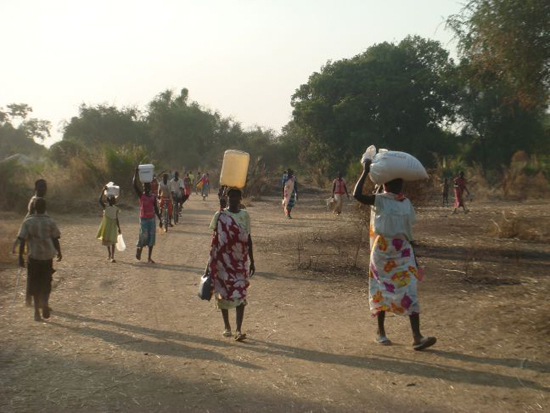MSF is responding to the arrival of thousands of refugees from Sudan's Blue Nile State into the new nation of South Sudan.

South Sudan 2011 © Jean-Marc Jacobs
Refugees arriving from Sudan's Blue Nile State.
Over the past two weeks thousands of refugees have crossed the border from Sudan into the newly independent South Sudan. This past Monday, November 28, Doctors Without Borders/Médecins Sans Frontières (MSF) started an emergency medical intervention in the village of Doro, some 40 kilometers [24 miles] from the border where the refugees have fled fighting in Sudan’s Blue Nile State. An estimated 13,000 men, women and children have already arrived and the MSF team has seen thousands more walking with what possessions they can carry from the border area towards the gathering-point at Doro.
“The place they are gathering is not a refugee camp yet, as the organisation and the allocation of plots to families is just starting,” says Jean-Marc Jacobs, Deputy Head of Mission in South Sudan, who was in the area last week to assess the need for an emergency medical response. “But the scrubland is filling up with refugees and the queue of new arrivals registering keeps getting longer. The sheer numbers are overwhelming the capacity of the local health clinic.”
Over the weekend MSF managed to get the first supplies of drugs and medical equipment to Doro, and on Monday a team of three medics started providing medical treatment for the refugees.
“For now we are concentrating on the most critically ill,” says Dr. Asaad Kadhum, coordinator of MSF’s emergency team on the ground in Doro. “So far today [mid-afternoon Tuesday] we have treated 118 patients in our clinic. Severe cases of malaria, diarrhea and respiratory diseases are our priority, and up till now we have treated 22 of these urgent cases. Now that we are getting up and running, we expect to see around 120 patients a day in our fixed clinic. But the camp is covering a large area and is growing, so we will need to start up a mobile clinic team as soon as possible to reach all those that need medical care.”
The MSF team will start a therapeutic feeding program over the coming days to treat the children under five affected by severe malnutrition. Vaccinations to prevent the spread of communicable diseases will be essential, and the team can already see that there will be a critical need for ante-natal and maternal health consultations, as there are many pregnant women who will be giving birth in extremely difficult conditions.
The needs are expected to increase in the coming days and weeks as more refugees arrive, and health care is not the only urgent requirement in Doro. There are only two boreholes in the area and people are queuing up to five hours, with the 13,000 refugees and the local inhabitants all trying to get the water they need. There is not a single latrine yet, and it is unclear how these people are going to get enough food.
“In a situation like this drinking water, sanitation and health care cannot be dissociated,” says Dr. Kadhum. “Our water and sanitation expert is evaluating what we more urgently need to put in place. And we are expanding the medical team to give us the flexibility to work where the needs are greatest, either in the camp or closer to the border crossing points.”
Many of the refugees have told MSF staff that they fled bombing in and around their villages in Blue Nile State. “I decided to leave my place as war was coming,” said a 50-year-old man in Doro. “We saw the aeroplanes. They bombed our village. We have been on the road for eight days. There were long lines of people walking with us. We arrived three days ago, but we only had the little food that we brought with us and we have spent a few days without food.”
Closer to the border, hundreds of families are scattered in the scrubland, getting some rest before starting the second part of their journey to Doro. “We think there are around 8,000 refugees on the move, walking slowly from the border crossings towards Doro,” says Dr. Kadhum. “They are exhausted, and they are terrified. You can see the fear in their eyes. And we do not know how many more people will cross the border in the days and weeks to come.”
The evolution of this crisis is hard to predict. Yet with many more refugees on the move, medical and basic material assistance will continue to be urgently needed and all possible measures must be taken to ensure that the refugees can find shelter in a safe and healthy environment.




